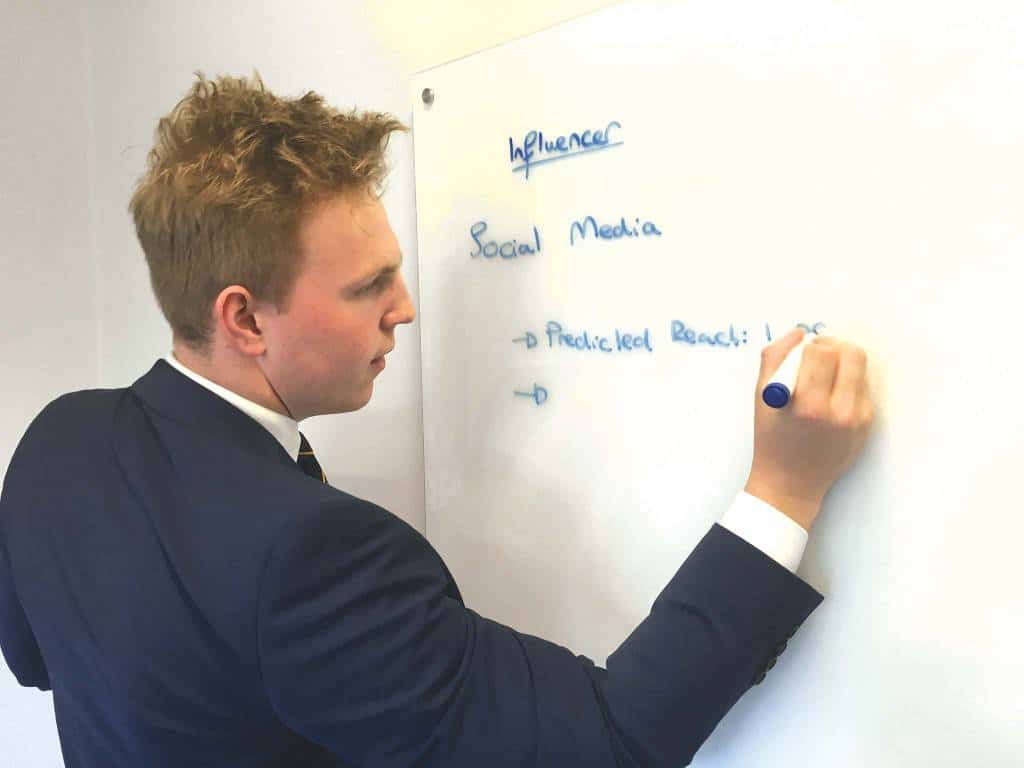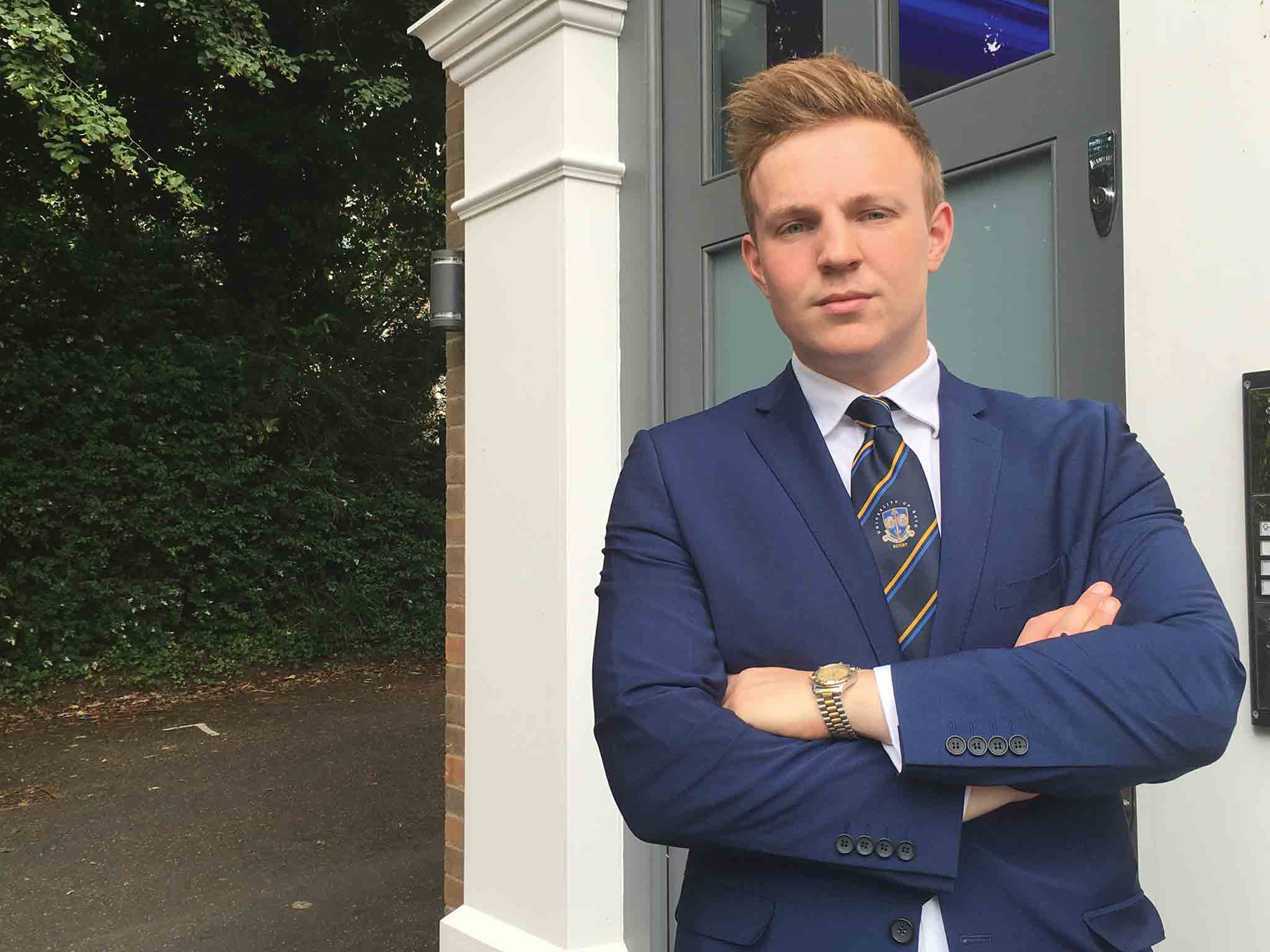Word of mouth, redefined – a sentence which sums up the modern world’s enthusiastic embrace of social media.
It is also the slogan of a new Tunbridge Wells start-up which has found a unique way of winning online endorsements from well-known celebrities for its clients and their products.
Influencer is the brainchild of Ben Jeffries, a 20-year-old entrepreneur whose own experience of the difficulties of harnessing social media to promote fledgling businesses led him to spot what he believes is a lucrative gap in the market.
The concept is simple and if all goes to plan, very rewarding.
Today, every celebrity or well-known blogger has an Instagram, Facebook or Twitter account that can reach thousands, if not millions, of people.
His company, which has been running for five months and is registered at Companies House, links clients with something to sell with those who are willing to endorse it – a group he refers to as the ‘influencers’.
In return, the former Tonbridge School pupil and current student of the University of Bath, takes a commission from a pre-arranged fee.
Ben has already secured a major coup – he was contacted by the PR agency of football legend Ronaldinho, who believed Influencer could help him to expand his reach into the UK.
This one sign-up alone means Ben can now offer his clients a person with a reach of 15 million followers to promote their brands.
And although he is developing a better online platform, his current system is very basic.
It involves keeping a database of his clients and ‘influencers’ on Excel, alongside a description of what each ‘influencer’ specialises in and the number of their followers.
When a client wants a certain product promoted, for example a new item of clothing, Ben matches them with around ten of the ‘influencers’ he believes will be most suitable – in this case fashion bloggers and celebrities.
Once identified, he creates a profile of each one which is then sent to the client who selects which of them, often more than one, they believe is best and the most cost-effective.
The influencers set their own charges, but they tend to be roughly the same based on their reach, which for someone with 40,000 is around £200 per post.
“When an influencer signs up I will ask how much they want to receive as their post asking fee and then I take a commission of around 10 to 15 per cent.
“If they don’t know how much they want I will tell them how much they can expect to get, taking into account the number of followers and their level of engagement.
“We do have cases where an influencer may come along and will quote a ludicrous amount.
“I say that is no problem if that is what they want, but if there are four similar influencers with the same following and engagement ratios who are priced far lower, I will point this out and often they will cut their prices.
“And although £200 for a social media post is not that much, when you do it across the board with numerous influencers it soon adds up.”

The level of engagement is an important factor, Ben explains, because there is little value in someone with thousands of followers but who seldom uses their online accounts.
As for the big hitters, such as Ronaldinho, they certainly boost the company’s profile and if used well can be very lucrative, but just because he has a great number of followers does not mean he is necessarily the best person to use, said Ben.
“I find brands tend to get some of the best responses from ‘micro influencers’, those with 10-50,000 followers.
“The reason being is that they generate a more organic buzz because a lot of the time if you see a really big name endorsing a product people think it’s just another advert.”
He said the type of people who tend to fall into the category of ‘micro-influencer’ are food bloggers, fashion bloggers, fitness stars, photographers and artists.
“One of our photography experts is currently doing promotions for the tourist board.
“They are taking photos of the UK and hopefully encouraging people to come here because of what they see on his Instagram,” he said as an example.
“Its also important to make sure they are promoting something they like and believe in, otherwise it is not very authentic and people know it.”
At the moment, the business is not earning enough to be paying tax, although Ben believes it is still ‘worthwhile’ financially.
But recent developments mean he could soon see his company really take off after he entered a competition run by Young Start-up Talent and made it through to a Dragons’ Den-style final.
At stake is £50,000-worth of products and services from the businesses who contribute towards the competition.
“One of the perks of winning the competition is you get support from a lot of experts.
“This will give me access to an accountant and a law firm to sort out that side of the business, for instance.”
His second attempt at making a usable online platform is currently underway and he believes this, more than anything, will make his business model a success.
What he envisions is an online app that will allow clients to search for the type of influencer they want using key words – such as photography or football – and then browse through the results.
Once they select a number of influencers from the list, the app will automatically give them a quote price and contact the influencers to see if they are willing to do the promotion.
Payment can then be automatically arranged once each party agrees.
In effect, it will greatly enhance the company’s capacity and not be constrained by Ben’s limitations as a sole employee with only an Excel spreadsheet to work from – whilst juggling life at university.
“The direction of the company has to be getting this platform up and running in order to make it scalable.
“I hope to do this in the coming months and this will allow me to easily take on more than the 100 influencers I have already and grow to more than a thousand very quickly.”
At the moment he has around five influencers a day contacting him to sign up but he does not have the capacity to take them all on. Securing Ronaldinho was ‘pot luck’, he said.
“I’m going to be honest and admit it was luck. His agency saw us on Google Adwords (an online advertising forum) and called me up saying they wanted help representing him in the UK.
“It was really good timing too because my largest client, the dating app Happn, was telling me they needed a big name and it just fitted together.”
THE MOTIVATION BEHIND INFLUENCER
Ben said he hopes to help start-ups on tighter budgets boost their profiles and brands as he knows how difficult that can be.
“When I was 16 I had a small clothing business called Breeze and I used to try and get in touch with celebrities to see if they would wear the products.
“I found that the majority of celebrities would either ignore you or charge ridiculous amounts, while their marketing agencies would say I needed a minimum of £15,000 to spend, which is unfeasible for a young start-up.
“The whole point of Influencer (the term he uses to describe those with a broad reach online who can help with product promotion) is to allow small companies to work on any budget size and make it easy for start-ups to boost their business right from the beginning.”
WHAT DOESN’T KILL YOU MAKES YOU STRONGER
Although Ben Jeffries’ Influencer start-up is already showing signs of being very successful, the journey to this point has not been easy.
At one stage in particular, it cost Ben much more than he bargained for.
“I tried to start the project on my gap year but ran into difficulties early on,” he said.
“Because of the nature of the business, I have been trying to develop a decent online platform for both the clients and the influencers to use and make it easier for me to scale up the business.
“So I invested the money I had been saving up from work at a publisher and found a company based in India to develop it.
“The problem is they ran off with my money, and so I was back to square one.”
Although he wouldn’t be drawn on specifics, Ben admitted it had cost him ‘a lot’ and said it was in the region of ‘thousands’ of pounds.
“It was a bit unfortunate, but I guess you have to live and learn from your mistakes,” he said.
Undeterred, but with his financial resources much diminished, the first-year student was forced to resort to his current rudimentary Excel system as a stop gap while his online platform is being designed for the second time – but now through a trusted developer.
“When it came to the end of my gap year I thought, ‘I don’t need the platform necessarily’ and so I decided to push on.”
THE CLIENTS
Happn – Dating app
Uber – Taxi app
Lost Village Festival – Lincolnshire-based festival
Crowd Mobile – Mobile content provider
Badoo – dating app
Daniel Wellington – Watchmakers
South Beach – Swimwear
THE INFLUENCERS
Ronaldinho – Brazilian footballer
Amy Willerton – TV presenter and model
Perfect Daily Grind – Online coffee magazine
Ellie Hemmings – Lifestyle blogger
Emma Sheldon – Fashion Blogger
WHAT YOU PAY FOR (PER POST)
£250 – 50,000 People
£500 – 125,000 People
£750 – 200,000 People
£1000 – 300,000 People
£3000 – 1 million People
£10,000 – 5 million People+








